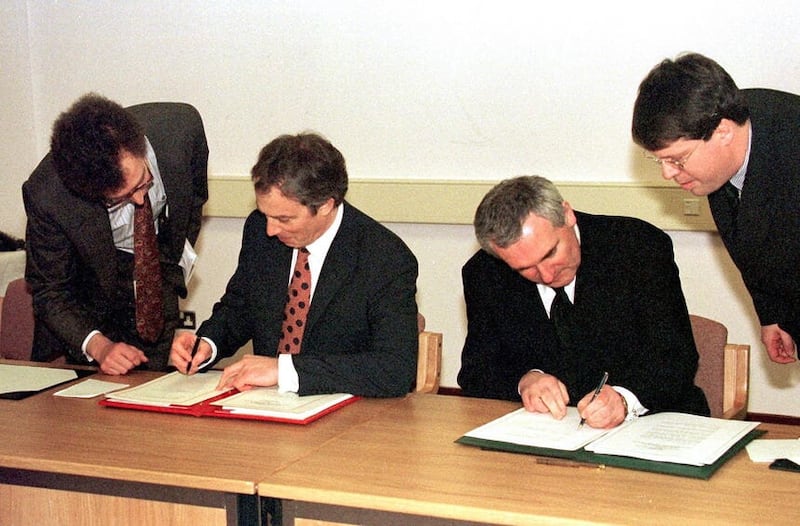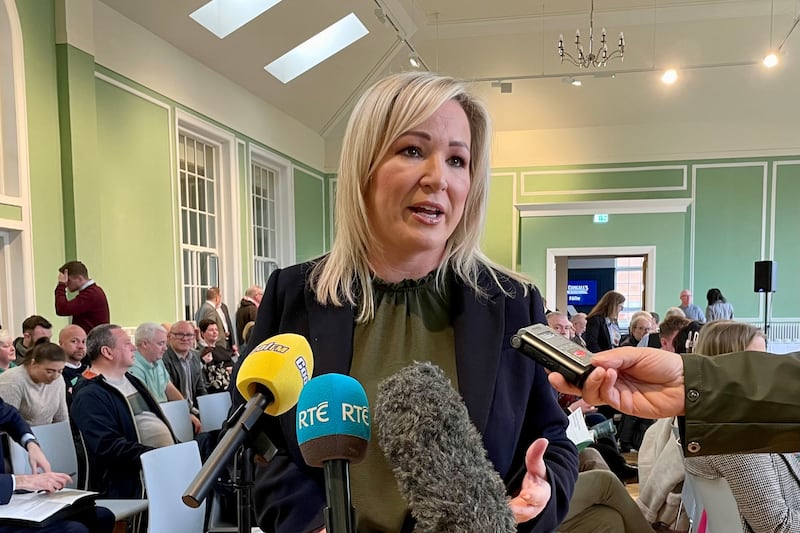THE GOOD Friday Agreement is a manifestation of the peace process – a process that began at least a decade before the accord was ratified by a referendum and one that in many respects continues to this day. The signing of the agreement is a landmark in modern Irish history, bringing the curtain down on a 30-year cycle of political violence and societal upheaval. It also marked the first time in what was then the near 80-year history of Northern Ireland that a significant section of unionism formally accepted the legitimacy of nationalist and republican ideology. Up to that point, the minority community's identity and aspirations were regarded as subversive, something to be discouraged and regularly repressed by the state apparatus.
On the other side of the coin, the agreement saw mainstream republicans recognise partition and concede that without the consent of a majority in the north, the border would remain in place. The acceptance of the unionist veto, coupled with the British government's previous declaration of having 'no selfish or strategic interest', created a new paradigm in which peace could prosper. The accord codified compromise and consensus, and where agreement couldn't be found filled that space with constructive ambiguity. Yet it proved enough to carry the support of a majority, albeit with more enthusiastic backing from nationalism. Something similar, though more hurried and less inclusive, had been tried with the Sunningdale Agreement some 25 years previous, only to be wrecked by a faction that arguably represented the peak coalescence of loyalism and unionism. Many of those involved in the 1974 Ulster Workers' Council strike would again - publicly at least - try and derail the renewed efforts to secure peace, before most climbed aboard themselves.
Conceived and developed by John Hume, aided by Gerry Adams, and ultimately sold to unionism by David Trimble – the nearest thing yet to an FW de Klerk figure – the deal also needed Tony Blair's young and fresh Labour administration to persuade soft unionism of the its merits. A proactive Dublin administration, along with Irish-America's influence were also key to what in retrospect looks like a serendipitous confluence of personalities and circumstances, as well as determination. Collectively, their counterparts today look meagre by comparison.
In the months before and after Good Friday 1998 it was clear that there were still those on both sides wedded to the gun and bomb, but society breathed a huge sigh of relief at the absence of widespread violence. The fear lifted, and previously closed communities opened up. The example set by David Trimble and John Hume, who engaged in deliberately public displays of reconciliation, helped decommission mindsets, pointing to new opportunities and potential partnerships in a post-Troubles society. The peace dividend never quite matched the expectation or hype in the immediate aftermath of the agreement but initially at least peace without a dividend was reward enough for many who'd lived through the previous decades.
The fledgling political institutions stumbled and stalled in the years after the accord, beset by wrangling over decommissioning and unionism's difficulties swallowing what it regarded as bitter pills, such as police reform. The two parties who'd done the heavy lifting to secure peace began to lose electoral support – the Ulster Unionists' vulnerabilities exposed on a daily basis by the DUP, while the SDLP too readily relinquished the baton of constitutional nationalism to Sinn Féin. The two governments' focus subsequently shifted from building consensus in the middle to seeking to bridge differences between two apparently irreconcilable sides. In their eagerness to put power-sharing on a sustainable footing they hollowed out the Good Friday Agreement and gifted the DUP an unsophisticated electoral strategy that it would repeat for the next decade, until being undone by its own hubris. Critics of the 2006 St Andrews Agreement also believe it ingrained the balkanisation of the north rather than developing the partnership approach aspired to in its predecessor. Ironically, the party that sought to undermine the agreement that delivered a lasting peace has been most eager in recent years to weaponise it as cover for its own self-inflicted shambles.

We've had countless deals since 1998, our political class seemingly wedded to process, with its regular stand-offs, showdowns and financial sweeteners. The signings of the St Andrews Agreement, the Hillsborough Agreement, Stormont House Agreement, Fresh Start and New Decade, New Approach never matched the collective elation of Good Friday 1998, a day on which everybody in the north over the age of 16 at the time recalls where they were. When judging the success of the agreement, we perhaps need to imagine what our expectations would have been a quarter of a century down the road. In that regard, it's arguably a failure. The institutions have generated thousands of column inches and endless hours of airtime but delivered comparatively little for the population. The peace, albeit imperfect, has held, yet reconciliation between communities hasn't matched the hope of the time. The ramifications of Brexit and the loss of unionism's assembly majority destabilised what was previously an uncomfortable status quo.
In 1998, unionist leaders with foresight took risks because they realised that their majoritarian strategy was neither politically or demographically sustainable. War-weary republicans also recognised the futility and counterproductiveness of their violent campaign. Similar introspection today would be welcome, to ensure the opportunities offered by the next 25 years aren't squandered in the interests of short-term expediency and party political advantage.







